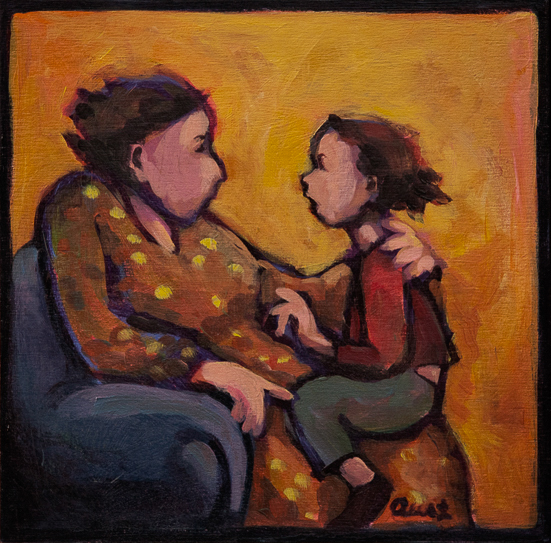Did your grandmother ever tell you God gave you two ears and one mouth for a reason? Mine did not, but it sounds like something a grandma would say. She would be right. The use of our ears for active listening is underrated, much to our disadvantage.
For five years, I have taught the skill of active listening in a class called “Skills Lab” in a Master of Divinity Clinical Counselling program at a university in Toronto. This class is mandatory for counselling students entering their internship placement. These placements range from private practices to larger clinics and offer services to kids, individuals and couples from many different cultural and socioeconomic backgrounds.
I advise my students that regardless of their client, the presenting concern, or their therapeutic approach, effective therapy hinges on one crucial skill: listening.
My first few lectures that set the stage for understanding this skill are typically met with nonchalance. I hear whispered comments like, “How hard can listening be? We do it every day.” Or, “My friends told me to become a therapist because I am a good listener already.” And the truth is, the students are typically correct. Many of them have a natural gift of being able to be with people in a non-judgemental, empathic way. However, by the fourth lecture, the attitude of nonchalance changes to a radical realization of necessity.
The textbook used for this class is Intentional Interviewing and Counseling: Facilitating Client Development in a Multicultural Society (Ivey and Ivey, 2014). It spends a considerable amount of time outlining the neurobiological impact of listening. Brain imaging shows that we are genuinely impacted when someone shows they are truly listening (Ivey and Ivey 2014, 65). The authors suggest several “micro-skills” to demonstrate to our clients that we genuinely listen to them. These include observing, paraphrasing, summarizing what has been said, reflecting back some of the client’s words, and using appropriate body language to mirror affect. When these skills are introduced (by that fourth lecture), distress shows on the faces of the budding therapists. Statements like, “So I hear you saying that…” or “If I heard you correctly…” followed by paraphrasing the client’s words, feel totally unnatural and are often met with resistance.
Essentially, my students are asserting that it is possible to actively listen without sounding like a parrot. I respond with two points. First, these skills, done well, are anything but parroting. Secondly, I encourage the students to actually give it a chance. And while I never suggest “therapizing” one’s own family, I do recommend trying out active listening skills as much as possible. I encourage the students to go home and humour me by using the skills being studied in a conversation with friends or family. The results are always staggering. The next class, I am almost always met with “My husband said I actually understood him!” or “My friend said for the first time they felt truly heard!” When I ask the student how they felt about the experience, their eyes light up.
These skills are not magical, yet they are truly transformative. What happens with simple words like “If I’m hearing you correctly…” or “Tell me a little more about…”? It seems that in the act of clarifying what was said in a gentle and compassionately curious way, we offer a rare liminal space, a place amid our chaotic, reactionary, information-filled world where we can slow down and offer the chance for someone to say what they mean, and for us to hear it—not just words, but meaning. This is important information not just for counseling students but also for us all.
What is done with the information that was heard might be a discussion for another time. However, the point is this: truly hearing one another might be one of the most critical catalysts for change. Not only is the speaker given a gift, but so is the listener. Offering a posture of hospitality to one another’s experiences, points of view, struggles and joys—despite and in light of differences—through the art of listening opens the door to experiencing our shared humanity. Only when we listen can we join in vulnerability and deeper understanding of one another.
Even after teaching listening skills, I still struggle with this. Despite grandmother’s admonitions about having double the amount of ears than mouths and wise proverbs about listening before speaking (Proverbs 18:13, to name just one), we still struggle with slowing down and offering hospitality to someone else’s words first. So, just like the counselling students, accept this as my invitation to experiment with the art and Biblical mandate of listening. Take a deep breath before you respond to something. Ask yourself if what you are about to say is needed and in whose interest it is. Try phrases like “So I just want to ensure I have understood you correctly…” Listening might not be comfortable, but being unheard is unnecessarily at the core of much of human pain.
Lyndsay Thompson is a Registered Psychotherapist in Ontario, Canada, and teaches in the Counselling and Thanatology Master’s Programs at Tyndale Seminary. Along with being the founding member of LCT Counselling (www.lctcounselling.com), she is currently completing her Doctorate in Spiritual Formation with a special focus in story, imagination, and wholistic personhood. Along with her vocational work, she enjoys writing, training for a marathon or fly fishing.

